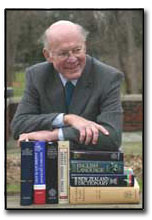January 2006
Talking about Words: Funny Spelling
With Richard Bailey
A recent trend in English is to duplicate words to nuance meaning. "When you say 'funny spelling,' do you mean 'funny funny' or 'funny weird'?"
For now, I mean "funny weird"—clusters of letters that barely look like English. Take yggdrassil, for instance. It's a word for a piece of Norse cosmology that explains our place in the universe. And it's an English word, even if it doesn't look much like one.
A would-be reformer of English spelling, George Bernard Shaw, pointed out that in our currently defective system the letters "ghoti" could just as well spell fish. In " ghoti," the sound of gh is the one found in enough; the o is the sound found in women, and the ti is the sound in the middle of nation.
Posthumous revenue from Pygmalion grew enormously, thanks to My Fair Lady, and, from the money, as directed in Shaw's will, a new alphabet was constructed in 1958 with one letter for every English sound (and no characters resembling those of other alphabets). You can download a set of fonts and write in it yourself.
Mark Twain alleged that English spelling had been invented by a drunken thief! And he wanted to sweep away the debris: the h in gherkin, for instance. Speaking in 1906 at a dinner at the Waldorf-Astoria, Twain said reforming English spelling would be a waste of time. We need to go back to the beginning and get the "funny weird" out.
If that happened, Twain said, the sturm and drang of spelling would blow away leaving clear skies behind. We would all be blissfully correct.
"And we shall be rid of phthisis and phthisic and pneumonia and pneumatics, and diphtheria and pterodactyl, and all those other insane words which no man addicted to the simple Christian life can try to spell and not lose some of the bloom of his piety in the demoralizing attempt."
One word I try to teach my students to spell is diphthong, but it's a fairly hopeless case, especially since after my class they won't have much occasion for it—any more than I have a use for phthisis. They don't have an enduring interest in diphthongs; I hope I don't need to use phthisis for any important occasion.
Part of the trouble that leads to
funny words is our lunatic desire to preserve letters that came dragging along into English and, once borrowed, were never pronounced—ptarmigan, for instance (from Scots Gaelic), knapsack (from German) or mnemonic (from Greek).
It was one thing to preserve, another to improve.
In Middle English, the word debt was spelled dette; it had been borrowed into English from French with just that spelling. But with the revival of learning—that is, the Renaissance—people wanted it to look as if it were from Latin debitus. Latin was better than French, as everybody knew, so looking Latin was better than looking French. Hence the growing popularity of debt drove det (what should be the modern form of dette) right out of the language.
In 1755, in his great dictionary, Samuel Johnson improved the spelling of dispatch—a spelling he used himself. He declared that the English word had come from the French verb depescher and so entered it in his dictionary as despatch even though all the authorities he quotes spell it with dis-. Dispatch, alas for Johnson's cause, has nothing to do with the French.
But thanks to Johnson, people began to spell the word in a funny way: despatch. English people have told me that they believe dispatch to be wrong, though they admit using it themselves. At the gate through which one enters Lincoln's Inn, adjacent to the Royal Courts of Justice in London, there is an elegant sign with an arrow directing messengers to turn right. It says despatches, apparently on the ground that legal documents deserve the high-flown spelling. The BBC also prefers despatches for the same or perhaps no obvious good reason. Australians use despatches about 15% of the time, New Zealanders only 10%. All of them have Samuel Johnson to blame.
Funny spelling can be downright welcoming: Kountry Kitchen, Kozy Korner, or Kandy Korn ®. But they can be deceptive too.
How many young people can't spell beetles because of the historic rock group?
Funny weird spellings can advance causes: grrlz, wimmin, herstory.
Funny spellings are sometimes "funny weird" and sometimes "funny funny."
In either case, they're fun.
Editor's note:
Washtenaw Community College names library for Richard Bailey

Richard W. Bailey is the Fred Newton Scott Collegiate Professor of English. His most recent book is Rogue Scholar: The Sinister Life and Celebrated Death of Edward H. Rulloff, University of Michigan Press, 2003--a biography of an American thief, impostor, murderer and would-be philologist who lived from 1821 to 1871. It was published by the University of Michigan Press in 2003.
|


